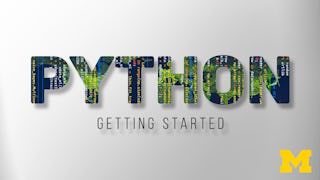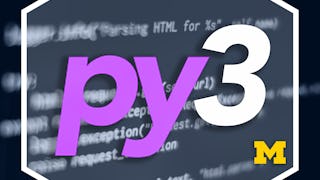Pseudocode
Results for "pseudocode"
 Status: Free TrialFree Trial
Status: Free TrialFree TrialSkills you'll gain: Data Structures, Algorithms, Software Visualization, Pseudocode, Programming Principles, Computational Thinking, Computer Science, Technical Communication, Program Development, Communication
4.6·Rating, 4.6 out of 5 stars758 reviewsIntermediate · Course · 1 - 4 Weeks

Skills you'll gain: Pseudocode, Programming Principles, Software Visualization, Computational Logic, Debugging, Computer Programming, Graphical Tools
Beginner · Course · 1 - 3 Months
 Status: Free TrialFree TrialU
Status: Free TrialFree TrialUUniversity of London
Skills you'll gain: Pseudocode, Algorithms, Computational Thinking, Computer Science, Data Structures, Program Development
4.4·Rating, 4.4 out of 5 stars26 reviewsBeginner · Course · 1 - 4 Weeks
 Status: Free TrialFree TrialD
Status: Free TrialFree TrialDDuke University
Skills you'll gain: Debugging, Programming Principles, Maintainability, Software Testing, Program Development, C (Programming Language), Algorithms, Pseudocode, Simulations, System Programming, Computer Programming, Data Structures, Software Development, Software Engineering, Command-Line Interface, Operating Systems, Development Environment, User Interface (UI), Problem Solving, Software Design
4.6·Rating, 4.6 out of 5 stars7.4K reviewsBeginner · Specialization · 3 - 6 Months
 Status: Free TrialFree TrialM
Status: Free TrialFree TrialMMicrosoft
Skills you'll gain: Graph Theory, Data Structures, Microsoft Copilot, .NET Framework, Algorithms, Back-End Web Development, Pseudocode, C# (Programming Language), Performance Tuning, Programming Principles, Server Side, Scalability
4.8·Rating, 4.8 out of 5 stars16 reviewsBeginner · Course · 1 - 3 Months
 Status: PreviewPreviewU
Status: PreviewPreviewUUniversity of Michigan
Skills you'll gain: Programming Principles, Python Programming, Computer Programming, Pseudocode, Computational Thinking, Data Structures, Development Environment
4.8·Rating, 4.8 out of 5 stars268 reviewsMixed · Course · 1 - 3 Months
What brings you to Coursera today?
 Status: Free TrialFree Trial
Status: Free TrialFree TrialSkills you'll gain: Cascading Style Sheets (CSS), User Experience Design, User Interface and User Experience (UI/UX) Design, User Experience, Design Research, Linux Commands, User Centered Design, Debugging, User Interface (UI), UI Components, Software Versioning, Software Visualization, Web Content Accessibility Guidelines, Pseudocode, JavaScript Frameworks, Javascript, Web Applications, Unit Testing, Application Development, API Design
Build toward a degree
4.7·Rating, 4.7 out of 5 stars23K reviewsBeginner · Professional Certificate · 3 - 6 Months
 Status: Free TrialFree TrialU
Status: Free TrialFree TrialUUniversity of London
Skills you'll gain: Pseudocode, C++ (Programming Language), Object Oriented Programming (OOP), C and C++, Object Oriented Design, Integrated Development Environments, Computer Programming, Programming Principles, Debugging, Data Structures, Program Development, Algorithms, Interactive Design, Data Modeling, UI Components, Software Engineering, Test Data, Data Validation, User Interface (UI), Unit Testing
Build toward a degree
4.7·Rating, 4.7 out of 5 stars238 reviewsIntermediate · Specialization · 1 - 3 Months
 Status: PreviewPreview
Status: PreviewPreviewSkills you'll gain: Computational Thinking, Pseudocode, Algorithms, Programming Principles, Computer Programming, Computer Programming Tools
Intermediate · Course · 1 - 4 Weeks
 Status: Free TrialFree TrialS
Status: Free TrialFree TrialSScrimba
Skills you'll gain: TypeScript, Event-Driven Programming, Javascript, JavaScript Frameworks, Pseudocode, Computational Thinking, JSON, Web Development, Web Applications, Data Import/Export, Application Development, Mobile Development, Debugging, Algorithms, Data Structures, Object Oriented Programming (OOP), Data Management, Programming Principles, Unit Testing, Web Development Tools
4.5·Rating, 4.5 out of 5 stars103 reviewsBeginner · Specialization · 3 - 6 Months
 Status: Free TrialFree TrialU
Status: Free TrialFree TrialUUniversity of Alberta
Skills you'll gain: Reinforcement Learning, Machine Learning, Sampling (Statistics), Artificial Intelligence and Machine Learning (AI/ML), Artificial Intelligence, Machine Learning Algorithms, Deep Learning, Simulations, Feature Engineering, Markov Model, Supervised Learning, Algorithms, Artificial Neural Networks, Performance Testing, Linear Algebra, Performance Tuning, Predictive Modeling, Pseudocode, Probability Distribution
4.7·Rating, 4.7 out of 5 stars3.6K reviewsIntermediate · Specialization · 3 - 6 Months
 Status: Free TrialFree Trial
Status: Free TrialFree TrialSkills you'll gain: Mainframe Computing, COBOL (Programming Language), Software Development Life Cycle, z/OS, Unit Testing, Systems Analysis, Job Control Language (JCL), IBM DB2, Systems Development, Debugging, Pseudocode, Software Development Methodologies, Virtualization, Agile Methodology, Software Development, Test Driven Development (TDD), Report Writing, Relational Databases, Software Testing, Technical Support
4.6·Rating, 4.6 out of 5 stars1.3K reviewsIntermediate · Professional Certificate · 3 - 6 Months
Most popular
 Status: Free TrialFree TrialU
Status: Free TrialFree TrialUUniversity of London
Specialization
 Status: Free TrialFree Trial
Status: Free TrialFree TrialBuild toward a degree
Professional Certificate
 Status: Free TrialFree Trial
Status: Free TrialFree TrialSpecialization
 Status: Free TrialFree TrialU
Status: Free TrialFree TrialUUniversity of Michigan
Course
Trending now
 Status: Free TrialFree TrialUI
Status: Free TrialFree TrialUIMultiple educators
Specialization
 Status: Free TrialFree Trial
Status: Free TrialFree TrialBuild toward a degree
Professional Certificate
 Status: Free TrialFree TrialU
Status: Free TrialFree TrialUUniversity of Michigan
Course
 Status: Free TrialFree Trial
Status: Free TrialFree TrialSpecialization
New releases
 Status: PreviewPreviewN
Status: PreviewPreviewNNortheastern University
Course
 Status: PreviewPreviewN
Status: PreviewPreviewNNortheastern University
Course







